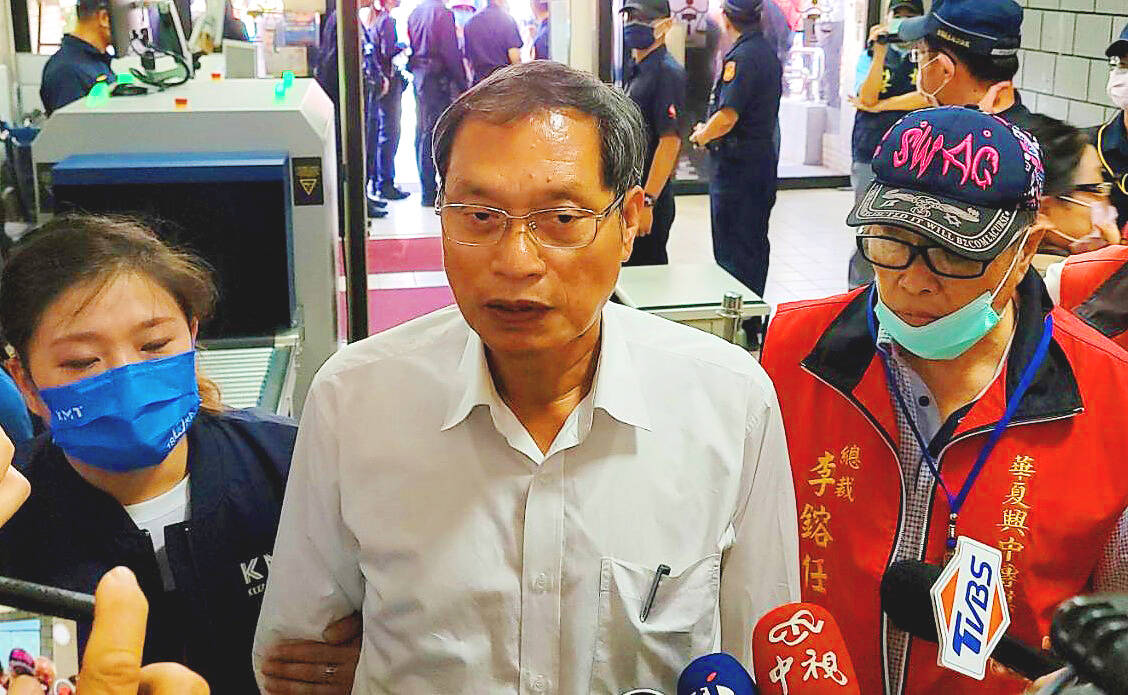The Pingtung District Court on Thursday dismissed a request for a recount by Su Ching-chuan (蘇清泉), the Chinese Nationalist Party’s (KMT) Pingtung County commissioner candidate in the Nov. 26 local elections.
Su lost to Democratic Progressive Party Legislator Chou Chun-mi (周春米) by a margin of about 11,000 votes, or 2.5 percent, prompting him to file a request with the court that ballots be secured and recounted.
The Civil Servants Election and Recall Act (公職人員選舉罷免法) sets a 20-day deadline for the district court in the respective jurisdiction where the election is held to order a recount.

Photo: Yeh Yung-chien, Taipei Times
The court last month rejected Su’s request that the ballots be secured, and on Tuesday launched an investigation into whether a recount was warranted.
It ruled against Su’s recount request, saying that the margin by which he lost was wider than the 0.3 percent limit set by the act that warrants a recount.
After the ruling, Su said he had filed a lawsuit against the Pingtung County Election Commission requesting that the election result be invalidated.
He said that more than 13,000 votes had been counted despite being invalid, adding that the vote count was “rife with illegalities and errors.”
Asked whether he would appeal Thursday’s ruling, Su said he would consult with his lawyer before making a decision.

Taiwan is stepping up plans to create self-sufficient supply chains for combat drones and increase foreign orders from the US to counter China’s numerical superiority, a defense official said on Saturday. Commenting on condition of anonymity, the official said the nation’s armed forces are in agreement with US Admiral Samuel Paparo’s assessment that Taiwan’s military must be prepared to turn the nation’s waters into a “hellscape” for the Chinese People’s Liberation Army (PLA). Paparo, the commander of the US Indo-Pacific Command, reiterated the concept during a Congressional hearing in Washington on Wednesday. He first coined the term in a security conference last

Prosecutors today declined to say who was questioned regarding alleged forgery on petitions to recall Democratic Progressive Party (DPP) legislators, after Chinese-language media earlier reported that members of the Chinese Nationalist Party (KMT) Youth League were brought in for questioning. The Ministry of Justice Investigation Bureau confirmed that two people had been questioned, but did not disclose any further information about the ongoing investigation. KMT Youth League members Lee Hsiao-liang (李孝亮) and Liu Szu-yin (劉思吟) — who are leading the effort to recall DPP caucus chief executive Rosalia Wu (吳思瑤) and Legislator Wu Pei-yi (吳沛憶) — both posted on Facebook saying: “I

The Ministry of Economic Affairs has fined Taobao NT$1.2 million (US$36,912) for advertisements that exceed its approved business scope, requiring the Chinese e-commerce platform to make corrections in the first half of this year or its license may be revoked. Lawmakers have called for stricter enforcement of Chinese e-commerce platforms and measures to prevent China from laundering its goods through Taiwan in response to US President Donald Trump’s heavy tariffs on China. The Legislative Yuan’s Finance Committee met today to discuss policies to prevent China from dumping goods in Taiwan, inviting government agencies to report. Democratic Progressive Party Legislator Kuo Kuo-wen (郭國文) said

The Ministry of Economic Affairs has fined Taobao NT$1.2 million (US$36,900) for advertisements that exceeded its approved business scope and ordered the Chinese e-commerce platform to make corrections in the first half of this year or its license would be revoked. Lawmakers have called for stricter supervision of Chinese e-commerce platforms and more stringent measures to prevent China from laundering its goods through Taiwan as US President Donald Trump’s administration cracks down on origin laundering. The legislature’s Finance Committee yesterday met to discuss policies to prevent China from dumping goods in Taiwan, inviting government agencies to report on the matter. Democratic Progressive Party